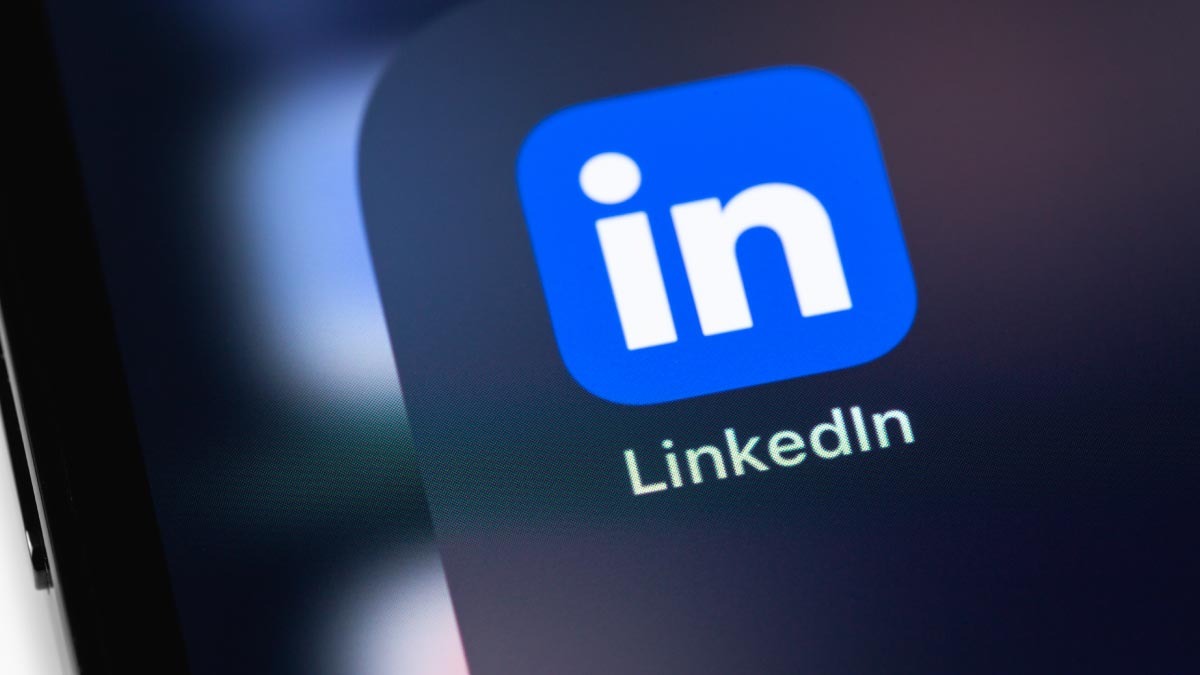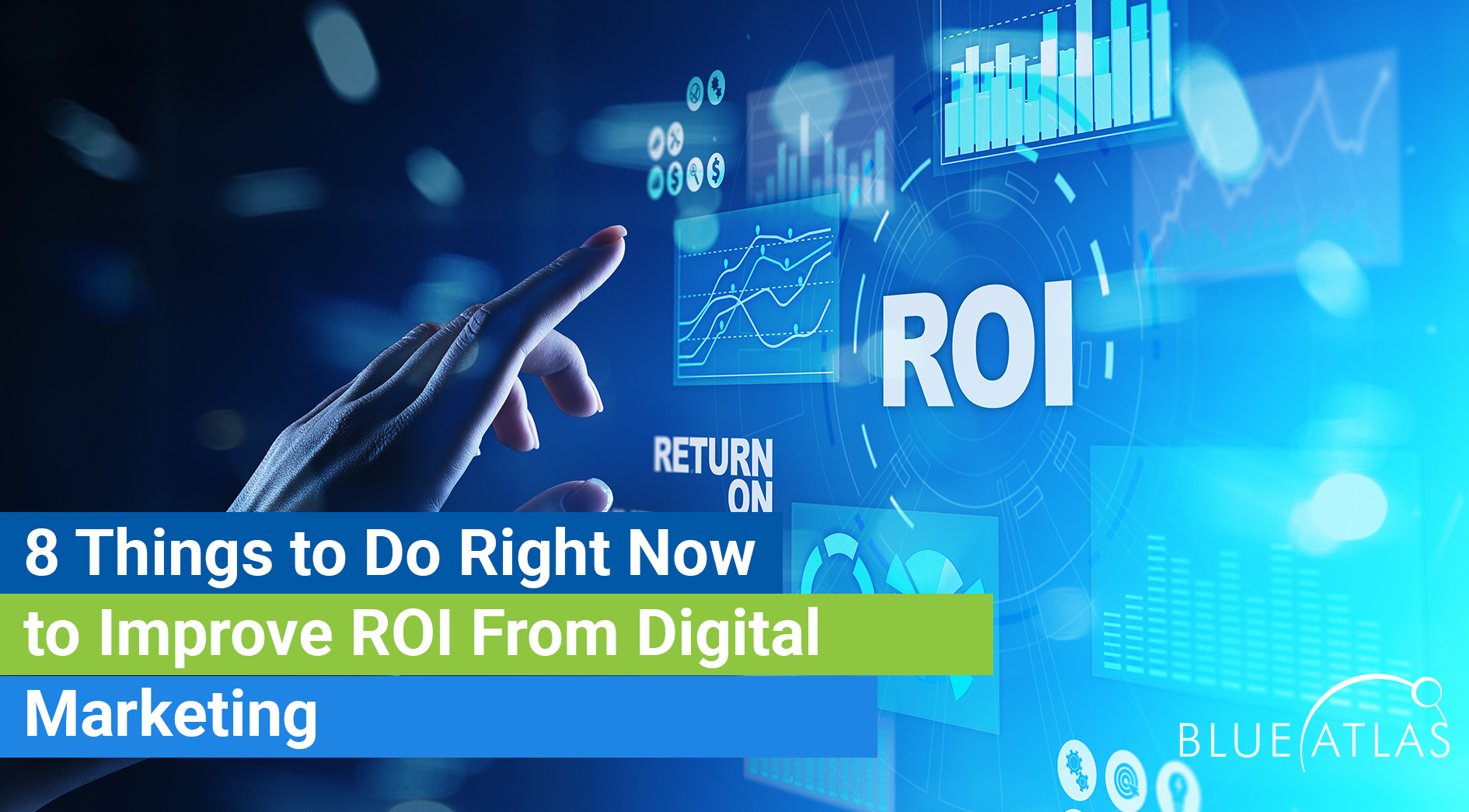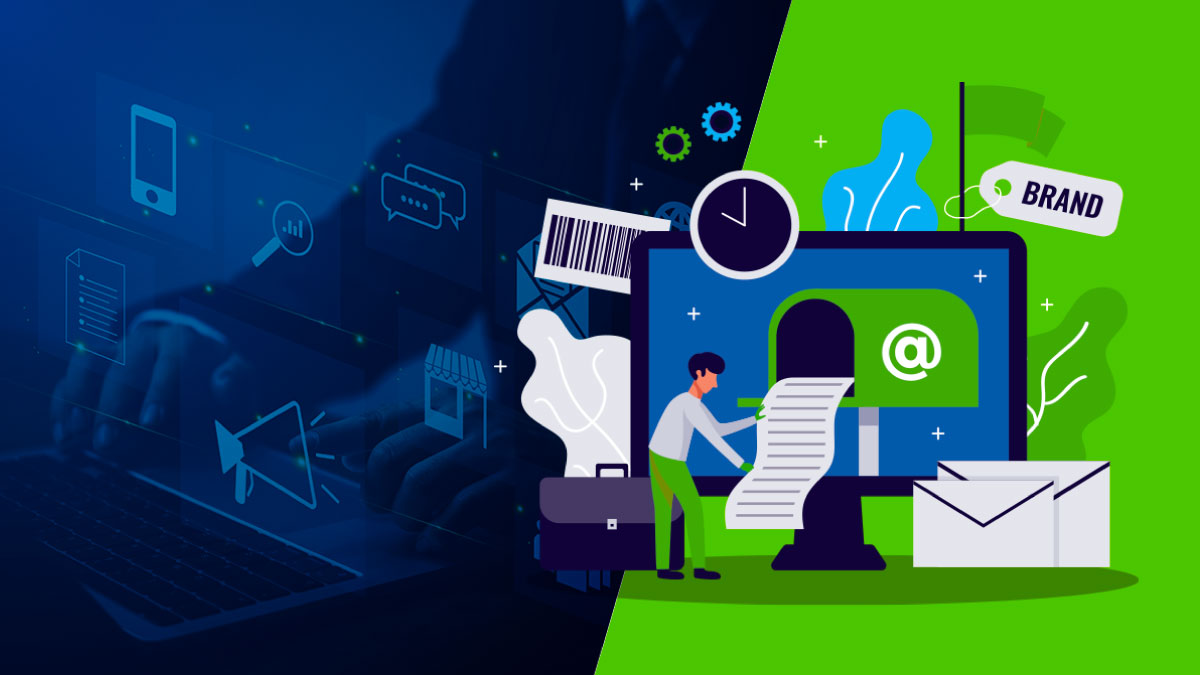Elevate Your Strategy with Product Events Marketing Automation
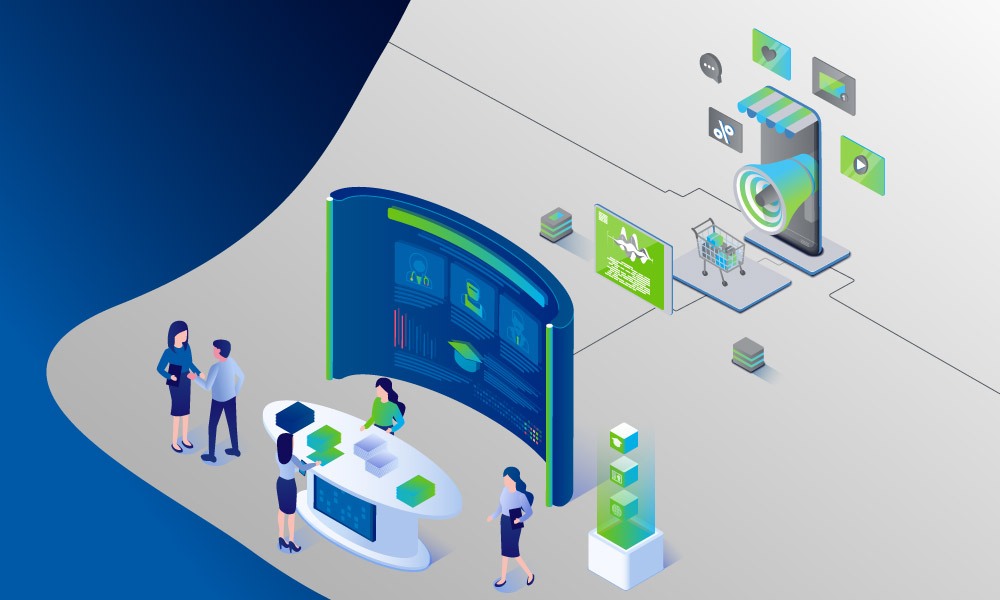
Unlock the potential of product events marketing automation, a powerful tool that transforms how you connect with potential customers. By leveraging event marketing automation tools, you can deliver seamless, personalized experiences at every stage of your event.
From precise follow-ups to timely reminders, this automation ensures your target audience feels engaged and valued. It’s not just about efficiency—it’s about creating lasting connections that drive higher attendance and conversions.
With smoother operations and valuable insights, product events marketing automation elevates your event strategy, empowering your marketing team to achieve exceptional results.
Key Takeaways:
What Is Product Events Marketing Automation?
Product events marketing automation is the process of using technology to automatically manage and optimize the many moving parts of event marketing.
From sending invitations to post-event follow-ups, automation handles repetitive tasks with precision, freeing teams to focus on strategy and creativity.
It bridges the gap between event planning and marketing, turning engagement into actionable outcomes.
Whether it’s boosting attendance, nurturing leads, or analyzing performance, this tool creates opportunities to grow your brand and impact.
When hosting events, automation can revolutionize how businesses manage their audience interactions.
Imagine sending personalized messages based on attendee actions—like signing up, checking in, or asking questions during a session.
This approach ensures timely communication, fosters stronger connections, and converts interest into measurable results.
Streamlining Every Stage of Event Management
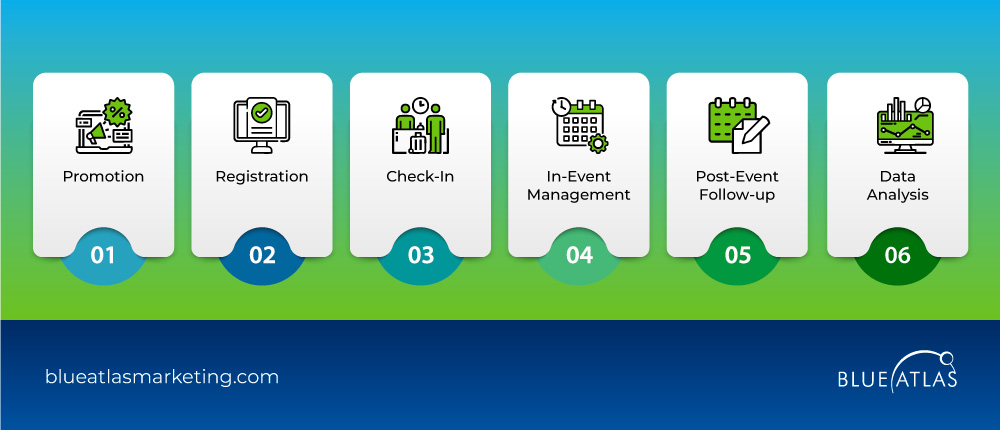
Automation shines brightest when streamlining processes from start to finish.
In the promotion phase, it can schedule social posts and email campaigns tailored to segmented audiences.
Once attendees register, automated systems can handle confirmations, reminders, and even seamless check-ins at the venue.
During the event, automation facilitates real-time connections.
From targeted push notifications to session updates, it ensures attendees stay informed and engaged.
Post-event, automation simplifies follow-ups by sending out thank-you notes, surveys, and tailored offers.
The result? Stronger relationships and valuable feedback. Even data collection and analysis become effortless.
Automated tools compile metrics such as attendance, session participation, and survey responses.
These insights empower businesses to refine strategies for future events without manual labor.
Key Features to Look for in Events Marketing Automation Tools
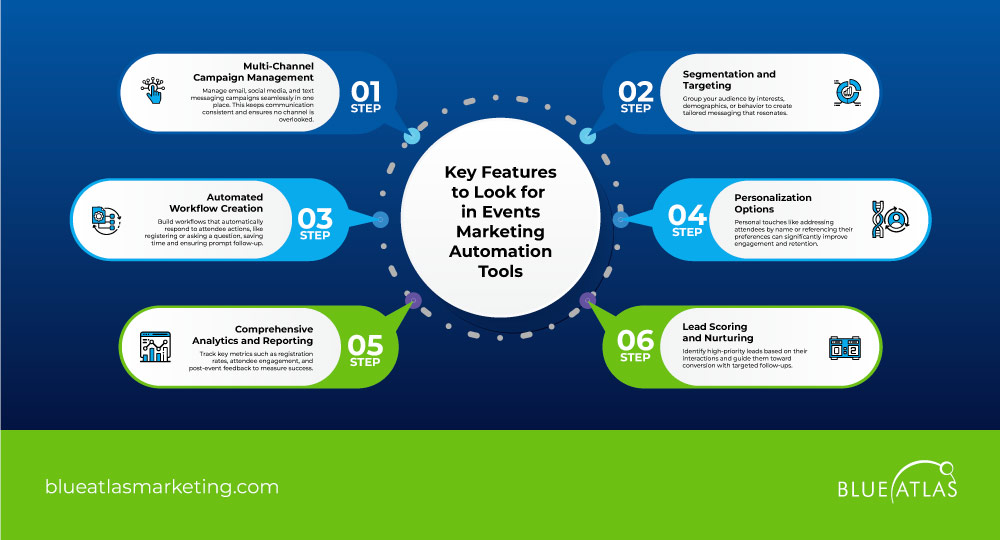
The right marketing automation tool can transform how you plan and execute events, but not all tools are created equally.
Here’s what to look for to ensure success at every stage of your event:
Features to Watch For
- Multi-Channel Campaign Management – manage email, social media, and text messaging campaigns seamlessly in one place. This keeps communication consistent and ensures no channel is overlooked.
- Segmentation and Targeting – group your audience by interests, demographics, or behavior to create tailored messaging that resonates.
- Automated Workflow Creation – build workflows that automatically respond to attendee actions, like registering or asking a question, saving time and ensuring prompt follow-up.
- Personalization Options – personal touches like addressing attendees by name or referencing their preferences can significantly improve engagement and retention.
- Comprehensive Analytics and Reporting – track key metrics such as registration rates, attendee engagement, and post-event feedback to measure success.
- Lead Scoring and Nurturing – identify high-priority leads based on their interactions and guide them toward conversion with targeted follow-ups.
Why These Features Matter
These features aren’t just bells and whistles—they’re for aligning tools with your event goals.
Personalization, for example, fosters deeper connections, making attendees feel valued.
Analytics tools provide actionable insights, helping you understand what worked and what didn’t, so you can continuously improve.
Segmentation ensures your messages hit the right audience, while automated workflows eliminate repetitive tasks, freeing your team to focus on strategy.
Together, these features streamline the entire event process, from initial outreach to post-event analysis, ensuring a smoother experience for both planners and participants.
How Does Product Events Marketing Automation Work?
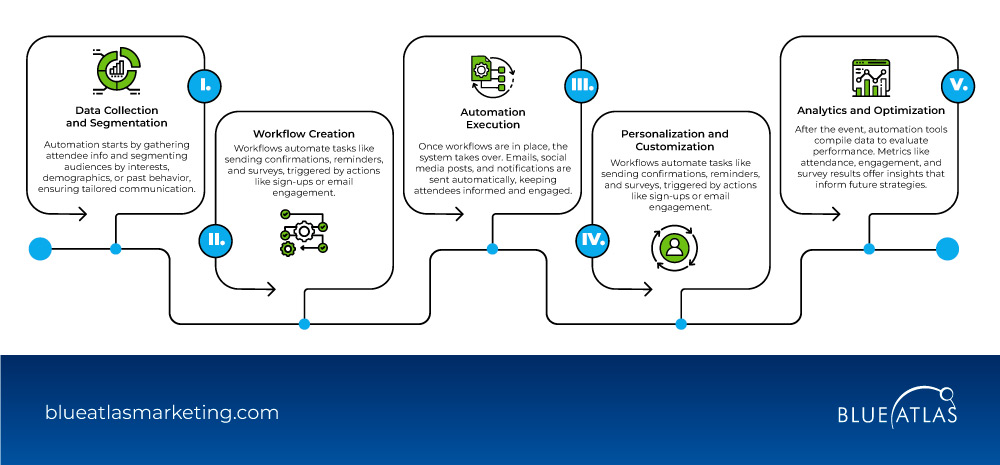
Product events marketing automation turns a complex process into a seamless flow, helping businesses manage everything from early planning to post-event follow-ups.
Let’s break down how it all comes together:
1. Data Collection and Segmentation
Automation begins with gathering attendee information and segmenting audiences based on interests, demographics, or past behavior. This ensures that communication is tailored to each group.
2. Workflow Creation
Next, workflows are designed to automate tasks like sending registration confirmations, reminders, and post-event surveys. These workflows respond to specific triggers, such as someone signing up or engaging with an email.
3. Automation Execution
Once workflows are in place, the system takes over. Emails, social media posts, and notifications are sent automatically, keeping attendees informed and engaged.
4. Personalization and Customization
Personalization ensures messages are relevant and meaningful. From addressing attendees by name to recommending sessions based on interests, it creates a more engaging experience.
5. Analytics and Optimization
After the event, automation tools compile data to evaluate performance. Metrics like attendance, engagement, and survey results offer insights that inform future strategies.
Maximizing Impact at Every Stage
Automation enhances every stage of the event cycle.
Tools streamline email campaigns and social scheduling during promotions, ensuring consistent messaging.
As the event unfolds, they handle real-time notifications and updates, keeping attendees in the loop.
Post-event, automation ensures timely follow-ups and collects valuable feedback without manual effort.
Businesses can focus on crafting impactful experiences by automating repetitive tasks while improving efficiency and boosting ROI.
The outcome? A better experience for attendees and event planners alike.
Why Businesses Need Automation to Maximize Product Event Success
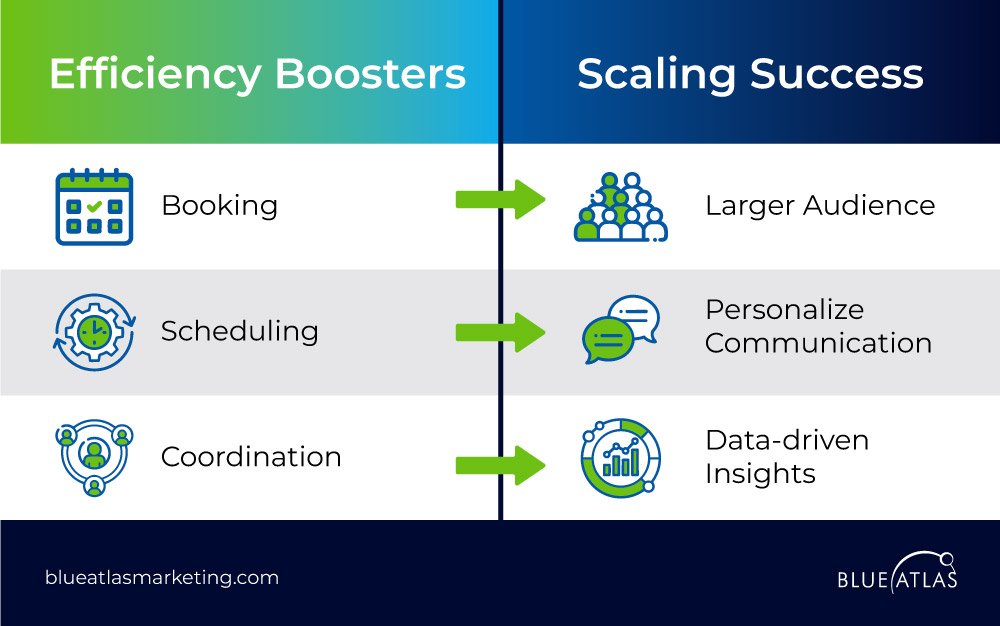
Automation isn’t just a convenience; it’s a necessity for businesses aiming to make their events more impactful.
Businesses can improve efficiency, minimize errors, and create more engaging experiences by automating routine tasks.
Boosting Efficiency and Accuracy
Automation simplifies event management by centralizing and automating tasks like booking, scheduling, and resource allocation.
Take this sample; it can handle booking venues, assigning rooms, and tracking equipment availability, all while ensuring every detail is accurately recorded.
With automated processes in place, there’s less room for human error, and teams can focus on higher-priority responsibilities.
The seamless coordination between departments enabled by automation ensures events run smoothly, from planning to execution.
Whether it’s avoiding double bookings or streamlining communications, automation helps eliminate inefficiencies that could disrupt the event experience.
Scaling Events and Increasing Conversions
For businesses aiming to scale their events, automation becomes revolutionary.
It tackles time-consuming, repetitive tasks, such as sending registration confirmations, managing attendee lists, and updating social media channels, enabling teams to manage larger events without additional overhead.
Automation also plays a critical role in improving conversions.
By leveraging data insights, businesses can send targeted communications that resonate with attendees, from personalized invitations to follow-ups tailored to individual preferences.
This targeted approach increases engagement and drives more conversions, turning attendees into loyal customers.
Automation isn’t limited to large enterprises; small businesses can also benefit by unlocking growth potential and handling expanding demands with ease.
The ability to optimize processes while scaling events ensures businesses stay competitive in an increasingly demanding marketplace.
5 Benefits of Marketing Automation for Product Events
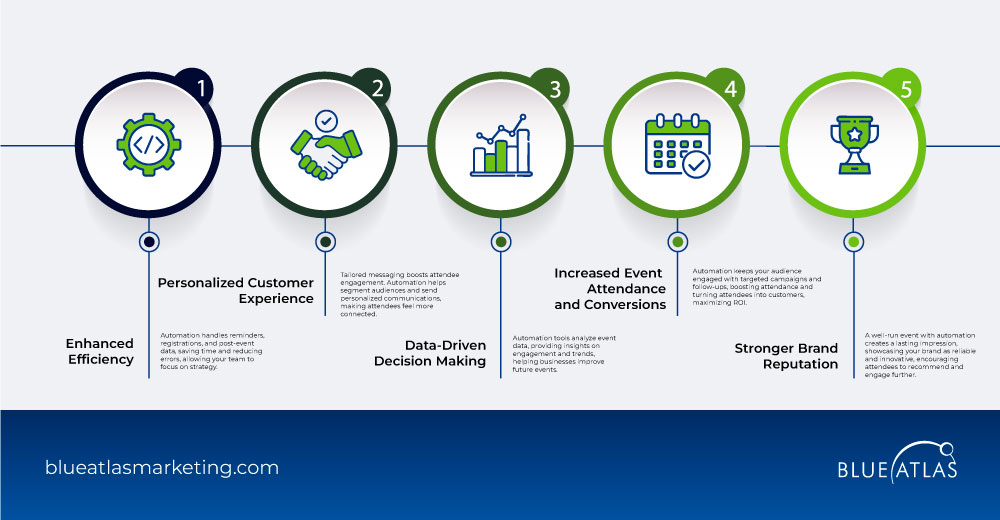
Marketing automation brings measurable improvements to product events by refining processes, enhancing attendee experiences, and delivering better results.
Here are five key advantages businesses can expect.
1. Enhanced Efficiency
Automation takes over repetitive tasks like sending reminders, managing registrations, and compiling post-event data.
This saves time, reduces errors, and allows your team to concentrate on creating impactful content and strategies.
The result is smoother operations with less manual effort.
2. Personalized Customer Experience
Tailored messaging is crucial for engaging attendees.
Automation allows you to segment audiences and send customized communications based on their preferences or behavior.
Whether it’s personalized event invitations or session recommendations, attendees feel more connected when their experience is designed for them.
3. Data-Driven Decision Making
Automation tools collect and analyze event data, offering valuable insights into attendee engagement, registration trends, and feedback.
This empowers businesses to make informed decisions for future events, optimizing what works and addressing areas for improvement.
4. Increased Event Attendance and Conversions
From targeted promotional campaigns to seamless follow-ups, automation helps keep your audience engaged.
The ease of managing communications ensures no one falls through the cracks, boosting attendance rates.
Additionally, timely, personalized follow-ups can turn attendees into customers, maximizing event ROI.
5. Stronger Brand Reputation
A well-organized, professional event leaves a lasting impression.
With automation ensuring smooth processes and meaningful interactions, your brand is positioned as reliable and innovative.
Attendees are more likely to recommend your events and continue engaging with your brand.
Best Practices in Product Events Marketing Automation
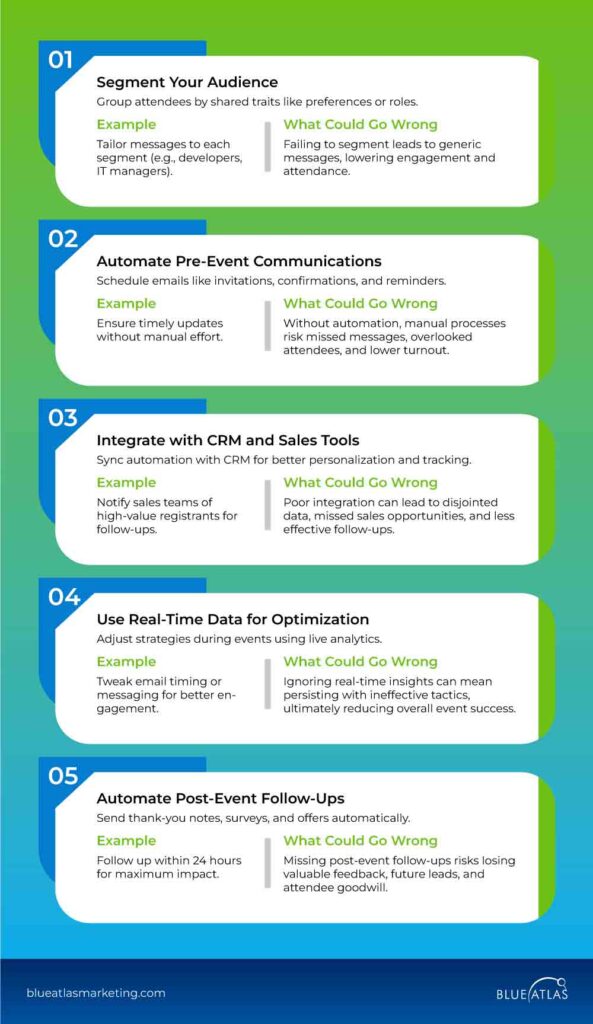
Using marketing automation effectively requires thoughtful planning and continuous refinement.
Here are actionable tips to make the most of your tools while ensuring your events deliver exceptional results.
Segment Your Audience
Audience segmentation involves dividing attendees into distinct groups based on shared characteristics like preferences, demographics, or past interactions.
For a tech product launch, you might create separate segments for software developers, IT managers, and business executives, tailoring messages to highlight what each group values most.
Failing to segment leads to generic communications that fail to resonate, resulting in reduced engagement and attendance.
Automate Pre-Event Communications
Automation ensures attendees receive timely and relevant emails, reminders, and updates ahead of the event.
An automated series could include an invitation email, a registration confirmation, and a reminder with tips for event participation, all scheduled in advance.
Without automation, manual processes can result in missed communications, overlooked attendees, and lower event turnout.
Integrate with CRM and Sales Tools
Integration connects your automation platform with CRM systems to provide a unified view of customer data, enhancing personalization and tracking.
A synchronized CRM might notify sales teams when high-value leads register for an event, enabling personalized follow-ups.
Poor integration can lead to disjointed data, missed sales opportunities, and less effective follow-ups.
Use Real-Time Data for Optimization
Leverage live analytics during campaigns to tweak strategies and improve outcomes on the fly.
Adjusting email timing or messaging mid-event based on low open rates or engagement metrics.
Ignoring real-time insights can mean persisting with ineffective tactics, ultimately reducing overall event success.
Automate Post-Event Follow-Ups
Automatically send thank-you emails, feedback surveys, and offers to attendees after the event.
Following up with a survey link and a discount code for future events within 24 hours of the event conclusion.
Missing post-event follow-ups risks losing valuable feedback, future leads, and attendee goodwill.
The Importance of Testing and Continuous Improvement
Automation isn’t a set-it-and-forget-it solution—it requires constant fine-tuning.
Regularly test different variations of your emails, landing pages, and workflows.
For example, experiment with subject lines, designs, or call-to-action buttons to identify what resonates most with your audience.
Monitor test results closely, looking for insights that can guide future campaigns.
Perhaps one email format results in higher engagement, or a specific tone performs better for certain audience segments.
Build on these insights to refine your automation strategy over time.
Ongoing optimization also helps ensure your automation aligns with changing goals and audience expectations.
Consistently monitoring and adjusting your campaigns will maximize the value of your marketing efforts.
Examples of Successful Product Events Marketing Automation
Product event marketing automation has empowered some of the world’s most recognizable brands to create more engaging and efficient event experiences.
Let’s explore real-world examples and their measurable successes:
| Platform | Feature | Product Event Marketing Automation Strategy |
| Apple | Personalized Announcements | Apple leverages automation to send tailored invitations to product launches, ensuring that attendees receive updates on products relevant to their interests. |
| Amazon | Event Reminders and Follow-Ups | Automated emails keep attendees informed about upcoming sales events like Prime Day. Follow-up surveys and thank-you emails help Amazon refine their future event strategies. |
| Netflix | Interactive Content for Virtual Events | Netflix uses automation to send personalized links and reminders for virtual premieres. Post-event, attendees receive polls to rate the content, improving future viewer engagement. |
| Airbnb | Localized Event Promotions | Airbnb automates email campaigns for hosting workshops and events, targeting users based on their locations and preferences, enhancing local community participation. |
| Tesla | Seamless Registration and Check-In | Tesla integrates automation for its product showcases, allowing attendees to register effortlessly and receive QR codes for fast check-ins. |
| eBay | Data-Driven Engagement Campaigns | eBay uses automation tools to analyze user behavior during events like seller conferences, tailoring content for future participation and boosting attendee satisfaction. |
Measurable Results
These brands demonstrate how automation delivers clear benefits. For instance:
Top Tools for Product Events Marketing Automation
Choosing the right tool for product events marketing automation can make or break the success of your events.
Here’s a breakdown of leading platforms, their functionalities, and when they work best:
Here’s a breakdown of leading platforms, their functionalities, and when they work best:
| Platform | Function | When to Use | Pricing |
| HubSpot | Multi-channel marketing and CRM integration | Ideal for managing campaigns across email, social, and CRM in one platform. | Professional Customer Platform US$1,170/monthIncludes 5 seatsAdditional seats start at $45/month Enterprise Customer Platform US$4,300/monthIncludes 7 seatsAdditional seats start at $75/month For more info, visit Hubspot |
| Eventbrite | Event registration and ticketing | Best for businesses hosting ticketed or public events. | – No fees for free events – 3.7% + $1.79 service fee per ticket – 2.9% payment processing fee per order – Fees are paid by ticket buyers on paid tickets, unless you choose to cover them. |
| Marketo | Lead nurturing and advanced analytics | Great for businesses focused on capturing and nurturing high-value leads. | Custom pricing available |
| ActiveCampaign | Email automation and segmentation | Perfect for small to mid-sized businesses with a heavy email focus. | Enterprise – $145/month Pro – $79/month Plus – $49/month Starter – $15/month |
| Bizzabo | Event planning and audience engagement | Excellent for hybrid events needing strong virtual and in-person features. | Event Experience OS – $499/user/month Experiential Onsite – Custom Pricing Available |
| Zoho CRM | Workflow automation and contact management | Best for smaller teams looking for affordable CRM integrations. | Standard – $14/user/month Professional – $23/user/month Enterprise – $40/user/month Ultimate – $52/user/month |
| Cvent | Event management and post-event analytics | Designed for large-scale conferences and corporate events. | Custom pricing available |
| Salesforce Marketing Cloud | Personalized marketing and AI-driven insights | Ideal for enterprises seeking advanced data-driven marketing solutions. | Professional – $1,250/org/month Corporate – $4,200/org/month Enterprise – Request a Quote |
Which Tool Fits Your Needs?
Each tool excels in specific areas, so selecting the right one depends on your event goals.
- If you’re hosting a large public event, Eventbrite simplifies ticketing and attendee tracking.
- For personalized email campaigns, ActiveCampaign delivers robust automation at an accessible price.
- Enterprises with complex marketing needs might find Salesforce Marketing Cloud or Marketo more suitable for their data and analytics capabilities.
- Budget is another important factor. Small businesses may gravitate toward cost-effective tools like Zoho CRM, while larger organizations can justify the custom pricing of feature-rich platforms like Cvent or Bizzabo.
Whether it’s streamlining event registration or analyzing post-event engagement, these tools ensure businesses can focus on delivering impactful experiences rather than getting bogged down in logistics.
Tips for Building an Effective Automation Strategy for Product Events
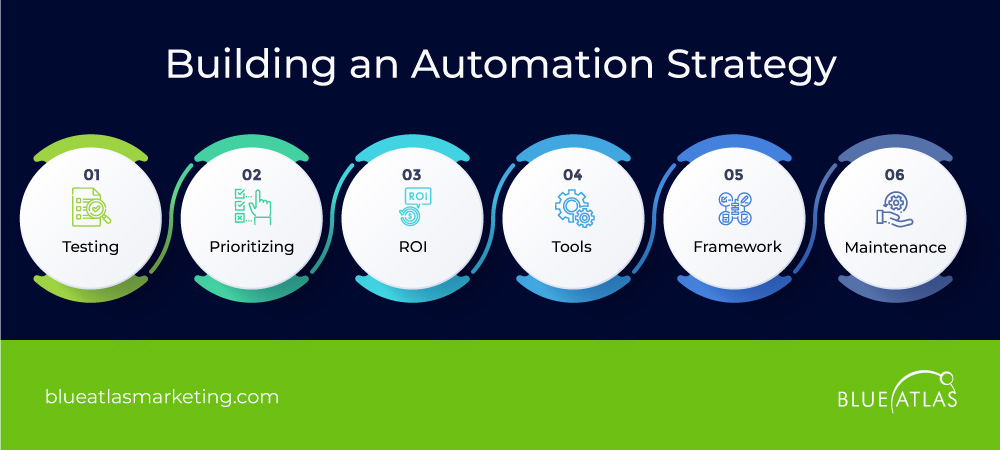
Crafting an automation strategy for product events requires a mix of thoughtful planning, the right tools, and continuous optimization.
Actionable Tips for Success
- Balance Automated and Manual Testing – while automation streamlines repetitive tasks, manual testing ensures a personal touch remains. For example, use automation for email scheduling but manually test key messages to confirm tone and accuracy.
- Prioritize Automatable Tasks – identify tasks that take up the most time but don’t require constant human intervention. These might include attendee reminders, session updates, or follow-up surveys. Automating these saves time and ensures consistency.
- Calculate ROI – evaluate the costs of implementing automation against the benefits, such as time saved and increased conversions. For example, if automation reduces follow-up time by 50%, you can justify investing in a premium tool.
- Choose the Right Tools – select platforms that align with your event goals. For instance, a tool like HubSpot might be ideal for integrating CRM with email campaigns, while Eventbrite works better for ticketing-focused needs.
- Develop an Automation Framework – plan a clear workflow that defines how and when each task is automated. This ensures all moving parts work together, from pre-event promotions to post-event follow-ups.
- Monitor and Maintain Automation – regularly check the performance of your automation system. This might mean adjusting workflows based on attendee feedback or analyzing data to refine future campaigns.
Setting Goals and Optimizing Workflows
Start by defining clear, measurable objectives for your automation efforts.
Are you aiming to increase attendance by 30%? Improve post-event engagement?
Clear goals help you track success and adjust strategies effectively.
Integration is another critical component. Linking automation tools with CRM systems allows for a seamless flow of attendee data.
This ensures a more personalized experience and provides valuable insights for future planning.
Finally, optimize workflows continuously. Automation isn’t a one-and-done process. Analyzing data and soliciting feedback can refine your strategy to achieve even better results.
Frequently Asked Questions (FAQs)
What are the key advantages of product events marketing automation?
Automation boosts efficiency by streamlining tasks like email marketing and lead nurturing. It personalizes attendee experiences, enhances engagement, and provides real-time insights into customer interactions, helping event organizers refine their digital marketing and customer service strategies.
How does automation support post-event communication?
Automation ensures timely follow-ups with thank-you emails, feedback surveys, and customized offers. This consistent communication helps event organizers stay connected with attendees, strengthening relationships and driving further actions through effective digital marketing tactics.
Which tools are best for product events marketing automation?
Platforms like HubSpot, Eventbrite, and Marketo are great options, depending on your event needs and budget. These tools provide features for managing email marketing, lead nurturing, and customer service, streamlining event management and marketing efforts for organizers.
Why is personalization crucial in event marketing automation?
Personalization drives engagement by tailoring messages to individual preferences and behaviors. This strengthens connections, improves attendee experience, and enhances lead nurturing, ultimately boosting conversions through more relevant and timely customer interactions.
How can I connect product events marketing automation with my CRM?
Integrating your automation platform with your CRM ensures smooth data sharing, allowing for personalized communication. This integration enhances marketing processes, optimizes customer service, and ensures timely, relevant interactions with leads and event attendees throughout their journey.
Product events marketing automation offers a powerful way to reach the right people and engage event attendees with precision. By automating repetitive tasks and leveraging key automation features, businesses can enhance efficiency, boost attendance, and improve conversions.
Personalizing communication based on attendee behavior strengthens connections and reinforces brand reputation.
Whether optimizing pre-event promotions or perfecting post-event follow-ups, automation empowers teams to focus on creating impactful experiences that resonate with attendees and drive long-term success.
Why Choose Blue Atlas Marketing?
Ready to take your next event to the next level? Discover how our marketing automation solutions can optimize your marketing processes and engage attendees at the right time.
With tailored strategies and cutting-edge automation technologies, we help businesses drive ROI and build lasting connections.
Reach out to Blue Atlas Marketing today to elevate your product events marketing automation and make your next event a success.

